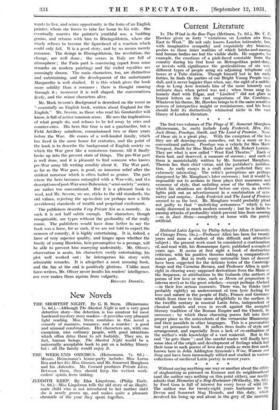Medieval Latin Lyrics, by Philip Schuyler Allen (University of Chicago
Press, 18s.).—Professor Allen has been for twenty years and more a student of this difficult and attractive subject ; the present work must be considered a continuation of, and read with, his Romanesque Lyric, published a couple of years ago. It seems at first sight a book of destructive criticism, with his positive theories taking a comparatively minor part. But in truth many untenable lines of descent have been suggested for the delicate lyrics of the Cambridge Songs and the Carmina Burana, and Professor Allen is quite right in clearing away supposed derivations from the Mime or the Sequence, or attributions to the Goliards (the authors of poems of low love or wine, such as Meum est propositum in taberna mori) or to the great scholars—except perhaps Abelard —in their less serious moments. There was, he thinks (and probably rightly) an undercurrent of. true lyric feeling for love and nature in the people of Italy, France and Germany which from time to time came delightfully to the surface, in the twelfth century in musical Latin form, independent of classical models and even in revolt against the accepted literary tradition of the Roman Empire and the Church, its successor ; by which these charming poems fall into their proper place as the antecedents of the vernacular Minnesongs and their parallels in other languages. This is a provocative but yet persuasive book. It suffers -from faults of style and arrangement, and especially from a lack of co-ordination of the author's wide knowledge of a vast material. But in the end "he gets there " ; and the careful reader will finally have some idea of the origin and development of feelings which had their issue in such poems of love and youth as were first made known here in John Addington Symonds's Wine, Woman and Song and have been increasingly edited and studied in• various collections of medieval Latin poetry inrecent years.
* .* * -






























 Previous page
Previous page